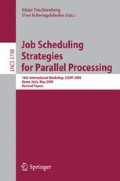Abstract
In this paper, we examine the concept of giving every job a trial run before committing it to run until completion. Trial runs allow immediate job failures to be detected shortly after job submission and benefit short jobs by letting them run and finish early. This occurs without inflicting a significant penalty on longer jobs, whose average and maximum waiting time are actually improved in some cases. The strategy does not require preemption and instead uses the ability to kill and restart a job from the beginning, which it does at most once for each job. While others have proposed similar strategies, our algorithm is distinguished by its determination to give each job a fixed-length trial run as soon as possible. Our study is also more focused, including a detailed description of the algorithm and an examination of the effect of varying the length of a trial run.
Access this chapter
Tax calculation will be finalised at checkout
Purchases are for personal use only
Preview
Unable to display preview. Download preview PDF.
References
Feitelson, D.G., Rudolph, L. (eds.): IPPS-WS 1997 and JSSPP 1997. LNCS, vol. 1291. Springer, Heidelberg (1997)
Feitelson, D.G., Rudolph, L., Schwiegelshohn, U. (eds.): JSSPP 2002. LNCS, vol. 2537. Springer, Heidelberg (2002)
Chiang, S.-H., Arpaci-Dusseau, A., Vernon, M.K.: The impact of more accurate requested runtimes on production job scheduling performance. In: Proc. 8th Workshop on Job Scheduling Strategies for Parallel Processing, [2], pp. 103–127
Chiang, S.-H., Mansharamani, R., Vernon, M.: Use of application characteristics and limited preemption for run-to-completion parallel processor scheduling policies. In: Proc. ACM SIGMETRICS Conf. on Measurement and Modeling of Computer Systems, pp. 33–44 (1994)
Chiang, S.-H., Vernon, M.K.: Production job scheduling for parallel shared memory systems. In: Proc. 15th IEEE Intern. Parallel and Distributed Processing Symp. (2001)
Downey, A.B.: Using queue time predictions for processor allocation. In: Proc. 3rd Workshop on Job Scheduling Strategies for Parallel Processing [2], pp. 35–57
Feitelson, D.: The parallel workloads archive, http://www.cs.huji.ac.il/labs/parallel/workload/index.html
Gibbons, R.: A historical application profiler for use by parallel schedulers. In: Proc. 3rd Workshop on Job Scheduling Strategies for Parallel Processing [1]
Kettimuthu, R., Subramani, V., Srinivasan, S., Gopalsamy, T., Panda, D.K., Sadayappan, P.: Selective preemption strategies for parallel job scheduling. Intern. J. of High Performance Computing and Networking 3(2/3), 122–152 (2005)
Lawson, B., Smirni, E., Puiu, D.: Self-adapting backfilling scheduling for parallel systems. In: Proc. 31st Intern. Conf. Parallel Processing, pp. 583–592 (2002)
Lawson, B.G., Smirni, E.: Multiple-queue backfilling scheduling with priorities and reservations for parallel systems. In: Proc. 8th Workshop on Job Scheduling Strategies for Parallel Processing [2]
Lee, C.B., Schwartzman, Y., Hardy, J., Snavely, A.: Are user runtime estimates inherently inaccurate? In: Feitelson, D.G., Rudolph, L., Schwiegelshohn, U. (eds.) JSSPP 2004. LNCS, vol. 3277, pp. 253–263. Springer, Heidelberg (2005)
Lifka, D.: The ANL/IBM SP scheduling system. In: Feitelson, D.G., Rudolph, L. (eds.) IPPS-WS 1995 and JSSPP 1995. LNCS, vol. 949, pp. 295–303. Springer, Heidelberg (1995)
Mu’alem, A.W., Feitelson, D.G.: Utilization, predictability, workloads, and user runtime estimates in scheduling the IBM SP2 with backfilling. IEEE Trans. Parallel and Distributed Syst. 12(6), 529–543 (2001)
Nissimov, A., Feitelson, D.G.: Probabilistic backfilling. In: Frachtenberg, E., Schwiegelshohn, U. (eds.) JSSPP 2007. LNCS, vol. 4942, pp. 102–115. Springer, Heidelberg (2008)
Perković, D., Keleher, P.J.: Randomization, speculation, and adaptation in batch schedulers. In: Proc. 2000 ACM/IEEE Conf. on Supercomputing (2000)
Schwiegelshohn, U., Yahyapour, R.: Improving first-come-first-serve job scheduling by gang scheduling. In: Feitelson, D.G., Rudolph, L. (eds.) IPPS-WS 1998, SPDP-WS 1998, and JSSPP 1998. LNCS, vol. 1459, pp. 180–198. Springer, Heidelberg (1998)
Shmueli, E., Feitelson, D.G.: On simulation and design of parallel-systems schedulers: Are we doing the right thing? IEEE Trans. Parallel and Distributed Systems (to appear)
Snell, Q.O., Clement, M.J., Jackson, D.B.: Preemption based backfill. In: Proc. 8th Workshop on Job Scheduling Strategies for Parallel Processing [2], pp. 24–37
Srinivasan, S., Kettimuthu, R., Subramani, V., Sadayappan, P.: Characterization of backfilling strategies for parallel job scheduling. In: Proc. Intern. Conf. on Parallel Processing Workshops, pp. 514–522 (2002)
Tsafrir, D., Etsion, Y., Feitelson, D.G.: Backfilling using system-generated predictions rather than user runtime estimates. IEEE Trans. on Parallel and Distributed Systems 18(6), 789–803 (2007)
Tsafrir, D., Feitelson, D.G.: The dynamics of backfilling: Solving the mystery of why increased inaccuracy help. In: Proc. IEEE Intern. Symp. on Workload Characterization, pp. 131–141 (2006)
Zotkin, D., Keleher, P.J.: Job-length estimation and performance in backfilling schedulers. In: Proc. 8th IEEE International Symposium on High Performance Distributed Computing, pp. 236–243 (1999)
Author information
Authors and Affiliations
Editor information
Editors and Affiliations
Rights and permissions
Copyright information
© 2009 Springer-Verlag Berlin Heidelberg
About this paper
Cite this paper
Thebe, O., Bunde, D.P., Leung, V.J. (2009). Scheduling Restartable Jobs with Short Test Runs. In: Frachtenberg, E., Schwiegelshohn, U. (eds) Job Scheduling Strategies for Parallel Processing. JSSPP 2009. Lecture Notes in Computer Science, vol 5798. Springer, Berlin, Heidelberg. https://doi.org/10.1007/978-3-642-04633-9_7
Download citation
DOI: https://doi.org/10.1007/978-3-642-04633-9_7
Publisher Name: Springer, Berlin, Heidelberg
Print ISBN: 978-3-642-04632-2
Online ISBN: 978-3-642-04633-9
eBook Packages: Computer ScienceComputer Science (R0)

